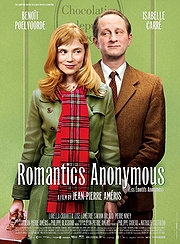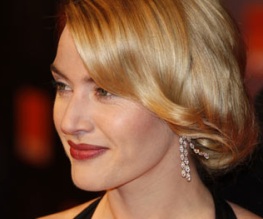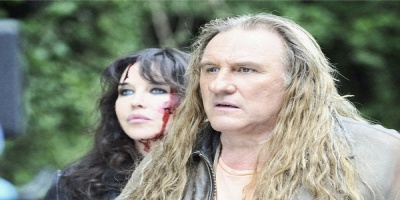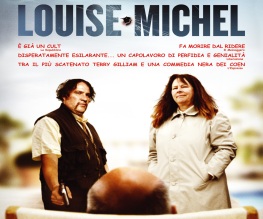Romantics Anonymous

Given the cinematic history of chocolate production, it would seem that the truly successful chocolatier must be either a sensual seductress or a rattled recluse. Happily, the stars of Romantics Anonymous owe more to Willy Wonka than to the rather more confident lovers of 2000’s Chocolat – even their product’s natural aphrodisiac qualities aren’t quite enough to compensate for their own, crushing coyness.
Angélique (Carré), a talented but hapless confectioner whose life-long battle with bashfulness forces her to hide behind a secret identity, is mistakenly hired to work for an ailing chocolate factory run by the equally insecure Jean-René Van Den Hugde (Poelvoorde) Jean-René’s therapist has been giving him tasks designed to help him overcome his fear of intimacy, which Jean-René puts into practice by asking his new employee out for dinner. The two strike up a friendship which must battle the odds (and a long list of idiosyncrasies) if it is to develop into something more – much to the delight of Angélique’s self-help group, ‘les émotifs anonymes’.
With Hollywood busy sexualising everything from guns to ghosts, Améris’ tale of awkward interaction endeavours to tell it as it is; painting a picture of romance and relationships that is as charmingly absurd as it is face-scrunchingly cringeworthy. Carré and Poelvoorde excel as the delightfully clumsy central couple, diverging from the school of Deschanel with a pair of performances that are as full of character as they are of quirk. There’s particular pleasure to be found in a fumbled first date, as Angélique takes talking points from a set of cue cards and Jean-René resorts to regular toilet-breaks in order to change his sweat-stained shirt; it’s impossible to resist the appeal of such disadvantaged chemistry.

However, whilst Romantics Anonymous is sprinkled with ingenuity – Angélique’s tendency to faint when anxious might be clichéd but is executed with such sympathy that it is never unwelcome – it is not enough to truly satisfy. Light, whimsical and desperately uneven, the film refuses to commit to a single, defining tone, robbing its romance of any real resonance. Although the characters (of which there are only really two) might be likeable enough, the inevitable outcome is so predictably, jarringly conventional that it undermines the budding couple’s convergent plights.
A romantic comedy written and directed by an actual, practising human being, Romantics Anonymous is a perfectly palatable, pithy and genuinely charming slice of confection. Slight enough to delight without leaving you doubled over and nauseous, this French fancy will leave you unfulfilled but still very much wanting more.





Recent Comments